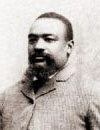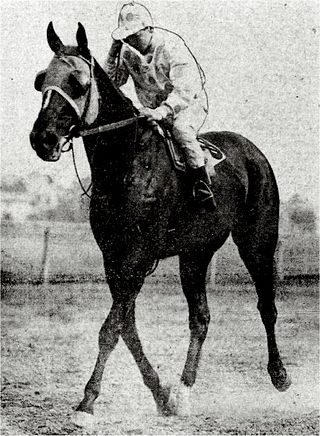Related Research Articles

Alydar was an American Thoroughbred race horse and sire. A chestnut colt, he was most famous for finishing a close second to Affirmed in all three races of the 1978 Triple Crown. With each successive race, Alydar narrowed Affirmed's margin of victory; Affirmed won by 1.5 lengths in the Kentucky Derby, by a neck in the Preakness and by a head in the Belmont Stakes. Alydar has been described as the best horse in the history of Thoroughbred racing never to have won a championship. Alydar's fame continued when he got older. He died under suspicious circumstances.

Roger L. Attfield is a Canadian thoroughbred horse trainer and owner and an inductee of both the Canadian and United States horseracing Halls of Fame.
Longfellow (1867–1893) was an American Thoroughbred Racing horse and sire.

Lexington was a United States Thoroughbred race horse who won six of his seven race starts. Perhaps his greatest fame, however, came as the most successful sire of the second half of the nineteenth century; he was the leading sire in North America 16 times, and broodmare sire of many notable racehorses.
John M. Veitch was an American Hall of Fame Thoroughbred horse trainer. The son of U.S. Racing Hall of Fame trainer Sylvester Veitch, he belonged to a family that has been in the horse-training business for three generations.

Miss Woodford (1880–1899) was a champion American Thoroughbred racehorse who was one of the top American fillies of all time, winning 16 consecutive races.
Kauai King was an American Thoroughbred racehorse was foaled on April 3, 1963, at Sagamore Farm in Glyndon, Maryland. His sire was Native Dancer and his dam was Sweep In. In 1966, Kauai King won the first two legs of the U.S. Triple Crown. To date, Kauai King is one of only two horses born in Maryland to have crossed the Kentucky Derby finish line first, but 1968 winner Dancer's Image was later stripped of his title, leaving Kauai King as the only official Maryland-bred winner of the Derby.

Edward Dudley Brown was an American who, although born as a slave, rose to become a Belmont Stakes-winning jockey, a Kentucky Derby-winning horse trainer, and an owner of several of the top racehorses during the last decade of the 19th century, earning him induction into the United States Racing Hall of Fame.

Black Gold was an American Thoroughbred racehorse that won the 50th running of the Kentucky Derby in 1924.

Sarazen (1921–1940) was an American Hall of Fame Champion Thoroughbred racehorse. Owned by Colonel Phil T. Chinn's Himyar Stud, Sarazen won his first three starts. Chinn then sold him for a huge profit to Virginia Fair Vanderbilt, who raced him under her Fair Stable banner.
Edward Riley Bradley was an American steel mill laborer, gold miner, businessman and philanthropist. As well as a race track proprietor, he was the preeminent owner and breeder of Thoroughbred racehorses in the Southern United States during the first three decades of the 20th century. Testifying before a United States Senate committee in April 1934, Bradley identified himself as a "speculator, raiser of race horses and gambler". He appeared on the cover of Time magazine on May 7, 1934. In the year 2000, the Florida Department of State honored him as one of their Great Floridians.

Peter Pan (1904–1933) was an American Thoroughbred racehorse and sire, bred and raced by prominent horseman, James R. Keene. As winner of the Belmont Stakes, the Brooklyn Derby and the Brighton Handicap, he was later inducted into the National Museum of Racing and Hall of Fame. His progeny included many famous American racehorses, including several winners of the Kentucky Derby and the Preakness Stakes.

Bull Lea was an American Thoroughbred racehorse who is best known as the foundation sire responsible for making Calumet Farm one of the most successful racing stables in American history. In their article on Calumet Farm, the International Museum of the Horse in Lexington, Kentucky wrote that Bull Lea was "one of the greatest sires in Thoroughbred breeding history."

Kentucky (1861–1875), was a successful American Thoroughbred racehorse who won 21 of his 23 starts, including 20 consecutive wins.
MacKenzie "Mack" Todd Miller was an American Thoroughbred racehorse trainer and owner/breeder. During his forty-six-year career, he conditioned seventy-two stakes winners, including four Eclipse Award champions.
James P. Conway was an American Hall of Fame trainer in Thoroughbred horse racing who trained forty-three stakes winners including five Champions and a winner of two American Classic Races.
Michael Manganello is a retired American Thoroughbred horse racing jockey.

Luke McLuke was a bay Thoroughbred stallion born in the United States. He won the 1914 Belmont Stakes, the Carlton Stakes, Kentucky Handicap, and Grainger Memorial Handicap among his four wins from six starts. After his racing career was over, he became a breeding stallion, siring 11 stakes winners. Two of his daughters were named as year-end Champions in the United States.

Harry Bassett (1868–1878) was an American Thoroughbred racehorse, winner of the 1871 Belmont Stakes and an outstanding racehorse of the 19th century. He also won a number of other stakes races, and was named the Champion male of his age group in 1870, 1871 and 1872. He was retired to stud duties in New Jersey when his five-year racing career ended, having recorded 23 wins from 36 starts. Harry Bassett died in New Jersey in 1878 and was inducted into the United States Racing Hall of Fame in 2010.

Hawaii (1964–1990) was a South African bred Thoroughbred racehorse who was a Champion at age two and three in South Africa after which he was sent to race in the United States by owner Charles W. Engelhard, Jr. where he was voted the 1969 American Champion Turf Horse honors, upstaging Fort Marcy who was American Grass Champion or co Champion in 1967, 1968 and 1970. Among his wins in the United States was a track record setting performance in the mile-and-a-half Man o' War Stakes on turf at Belmont Park. In South Africa he remains the only racehorse to have won all three Guineas staged in Durban, Cape Town and Johannesburg. The Hawaii Stakes run over 7 furlongs every first Saturday of March at Turffontein racecourse in South Africa is named after him.
References
- ↑ "Hall of Fame: Trainers - Henry Forrest" . Retrieved February 24, 2010.
- ↑ May 13, 1966, Time magazine article on Henry Forrest
- ↑ Middlesboro Daily News (Kentucky) - May 21, 1968
- ↑ The Bloodhorse.com Champion's history charts Archived 2012-09-04 at the Wayback Machine
- ↑ "Kentucky New Era - Google News Archive Search".
- ↑ April 7, 1975 New York Times obituary for Henry Forrest
- ↑ "Fair Grounds Hall of Fame" (PDF). Archived from the original (PDF) on 2017-10-11. Retrieved 2012-06-02.
- ↑ Henry Forrest at the National Museum of Racing and Hall of Fame